Cardiovascular System
All information about "Cardiovascular System" and the related magazine articles can be found here.
Our articles are written clearly and link to scientific studies where relevant. This is how we meet our own standards: we regularly deliver new, high-quality content for you—free of charge, no sign-up required, with the highest possible benefit to you.
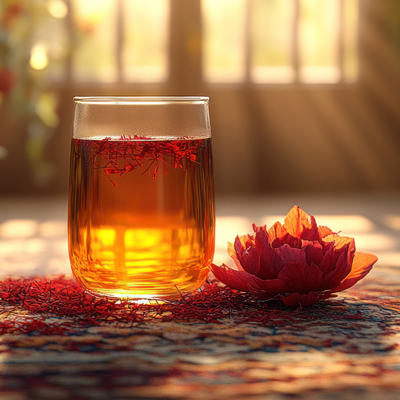
Your rest compass for the summer: Naturally in balance with saffron.
Gentle support from nature for mental serenity and your well-being
Does your inner rhythm sometimes falter in the hustle and bustle of everyday life and does your serenity wane? With saffron, nature offers a valued way to harmonize the carousel of thoughts and cultivate your inner center. Discover here how the red gold can lead you back to new balance and lightness.

Inner peace for hot days, with GABA and rose root extract
Support your nervous system with herbal active ingredients that can reduce stress, stabilize your mood and promote your mental balance even in the summer heat.
Summertime often brings stress due to heat, travel or busy schedules. GABA and the adaptogenic rose root extract help you to get through the summer more calmly by promoting your stress resistance and inner peace. So you can enjoy your emotional balance and greater well-being.

Light legs, light day. How horse chestnut, vitamin C and OPC help against heaviness
Discover how proven plant extracts and vitamins can relieve the feeling of heavy legs. For more lightness in everyday life for mom, grandma & co.
Heavy legs after a long day? Horse chestnut, vitamin C and OPC can promote blood circulation, strengthen the veins and noticeably relieve the feeling of tired, weighed-down legs. Ideal for anyone who stands a lot, walks a lot or simply wants to stay active in everyday life. Whether mom is out shopping or grandma is out for a walk. Find out how these natural active ingredients support your leg health and give you new lightness.
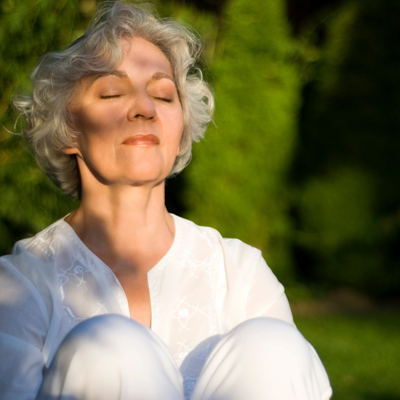
Mental strength in summer?
Ashwagandha and roseroot help you stay calm and alert on hot days
Summer brings light, energy and sometimes a lot of stress. So it's a good thing that nature has two herbal allies in the form of ashwagandha and roseroot, which can promote mental balance and resilience. Find out more!

Rescue for cozy summer evenings
Natural mosquito repellent with vitamin B1 & essential oils
Whether it's a garden party or an evening stroll: as soon as it starts buzzing, the mood is gone. Vitamin B1 and essential oils such as citronella or lavender can help to gently keep mosquitoes away. How does this work? Read here how natural remedies ensure carefree summer evenings.
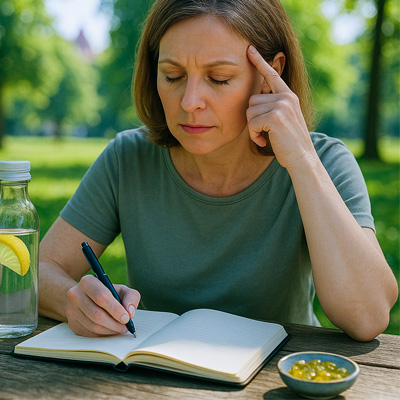
Summer, sun, full concentration!
How phosphatidylserine and omega-3 can boost your concentration
The sun is shining but your concentration is waning? Discover how phosphatidylserine and omega-3 fatty acids can naturally boost your mental performance.

Relaxed baby bump: Natural support with inositol, folic acid, cranberry & D-mannose
Balance and well-being for women who want to have children or during pregnancy
Wanting to have children or already pregnant? A lot changes during this special phase. Smart nutrients such as inositol, folic acid, cranberry and D-mannose can provide targeted support: They promote hormonal balance, strengthen the urinary tract and bring more balance to everyday life. Find out now how you can do something good for yourself naturally.
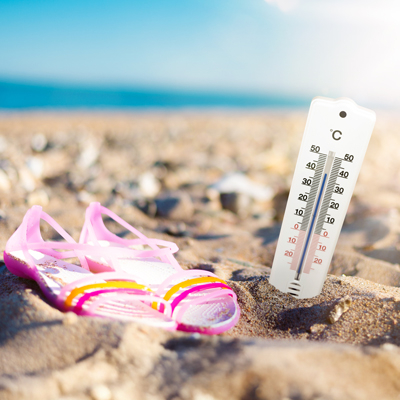
Start your vacation full of energy with potassium & magnesium citrate
How to keep you and your family fit, active and balanced even in the heat
On summer vacation, electrolytes such as potassium and magnesium quickly become unbalanced. This can affect energy, muscles and concentration. Find out here how you can strengthen your inner balance with smart nutrition and targeted supplements.
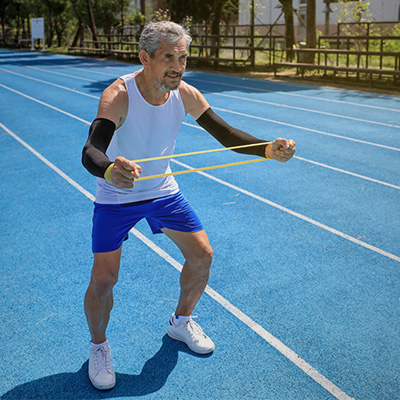
Strong heart, strong life. Promoting men's health naturally
Gain new energy and vitality with coenzyme Q10, chokeberry as a medicinal plant and targeted care for the cardiovascular system.
The heart is the engine of your life - and men in particular should pay special attention to it. Find out how you can use the effects of coenzyme Q10, the healing power of the aronia berry and a healthy lifestyle to strengthen the function of your cardiovascular system and support your overall health as a man.

When the hormone balance changes
Gentle nutritional support through the menopause
The menopause changes many things - both physically and emotionally. Myo-inositol, vitamin D3 and magnesium can help to boost your well-being, support your metabolism and activate new sources of energy. Find out more here!

Comfort food for super moms
Choline, lecithin & vitamin B12 - powerful micronutrients for a strong pregnancy
Did you know that certain nutrients can have a positive effect not only on your well-being, but also on your baby's development? Choline, lecithin and vitamin B12 are little helpers with a big effect - for strong nerves, clear thoughts and a good gut feeling during this special time.

Playground power for every day
Calcium & vitamin K2: For bone health that grows with you
Whether romping around with the children or the daily balancing act between job and family - strong bones are the stable foundation. Find out how calcium and vitamin K2 can playfully help to strengthen your bones.

Naturally powerful: Turmeric, boswellia & ginger
Learn how to gain more zest for life with plant power
Plant-based active ingredients can help to reduce inflammation and make everyday life more active and mobile - whether in the garden, during sport or on a family outing.
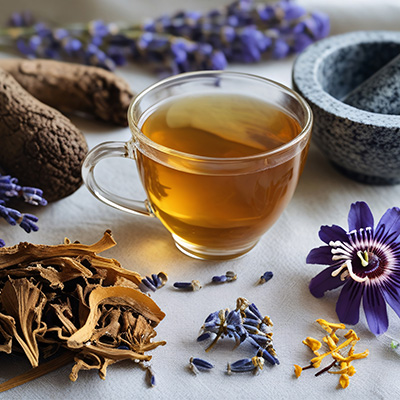
Finally sleep well again - even in summer!
Discover natural sleep aids with melatonin, passion flower & co.
Is the summer light depriving you of sleep? We show you how you can support your sleep-wake rhythm with natural remedies such as melatonin and passionflower.

Sun protection from within - with the power of vitamin A, astaxanthin and omega-3
Strengthen your skin with natural nutrients that reduce oxidative stress, soothe inflammation and prevent premature ageing.
The first rays of sunshine are here - but your skin is particularly sensitive after the winter. Discover how vitamin A, the antioxidant astaxanthin and essential omega-3 fatty acids can protect your skin from the inside out and optimally prepare it for UV radiation. For a radiantly healthy complexion and effective anti-ageing support.

Spring cleaning for the body!
Drain naturally - with nettle, dandelion & potassium
Find out more about dandelion, stinging nettle and potassium to gently drain your body and get back on track with ease!

Naturally against allergies - Black cumin oil and quercetin in use for your well-being
Gentle support from nature for hay fever, pollen allergies and allergic reactions
Itchy eyes, sneezing attacks and constant pollen stress? Black cumin oil and quercetin offer natural help for allergic symptoms. Find out how the two herbal active ingredients work, when it is the right time to use them and what you should look out for when choosing them.

Strong through the pollen season with omega-3 and vitamin E
How to strengthen your child's airways
When pollen irritates the airways, it can quickly become unpleasant for children. Find out why omega-3 and vitamin E can not only support but also prevent and how you can easily incorporate the two substances into your everyday life!
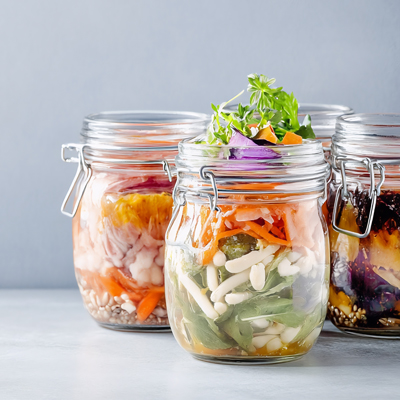
Fit for spring: Stimulate metabolism with inulin, probiotic foods & intestinal cure
Intestinal cleansing for better digestion, the natural effects of inulin and the benefits of probiotic foods for your metabolism
Get a vital start to spring and bring your body into balance - with targeted nutrition that boosts your metabolism, supports digestion and rebalances your gut with the help of a gut cleanse, inulin and probiotic foods. Find out how to boost your gut health and gain new energy - from the inside out!
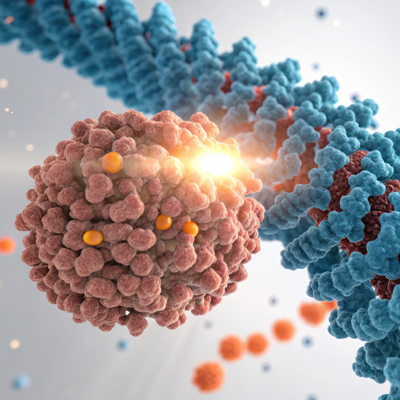
New cell energy with B vitamins, NADH and alpha lipoic acid
NADH, alpha lipoic acid and B vitamins play a central role in human metabolism for energy, concentration and cell protection.
Discover how these nutrients support the body against exhaustion, oxidative stress and loss of performance - for more vitality and mental strength in everyday life!
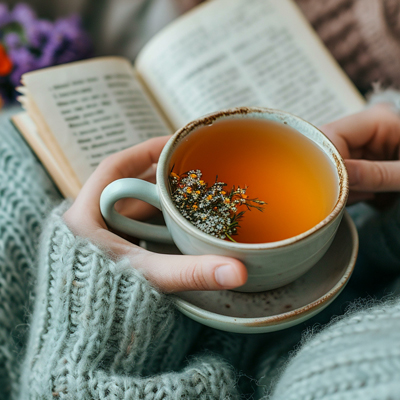
Sleep better with lemon balm, passionflower and L-theanine
These natural helpers bring peace to your evening
Sleep disorders? Stress in the evening? Herbal helpers such as lemon balm, L-theanine and passionflower can gently support the sleep-wake rhythm and help you to finally calm down. Read the article now to find out how you can harness the power of nature for restful nights.

Spring fever for the soul
Naturally more balance with 5-HTP, L-tryptophan and vitamin B6
The sun is shining - but everything still feels heavy inside?
These three mood boosters gently help you arrive in spring: for more rest, sleep and stability. Find out more here!
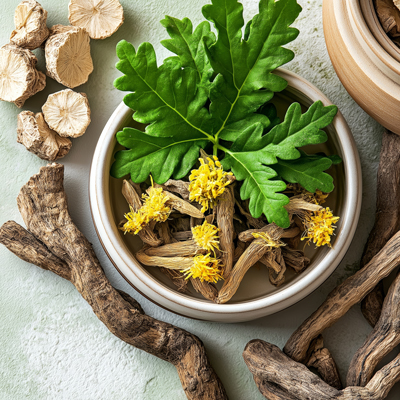
Building inner strength - more relaxed through spring
Plant adaptogens for more balance, energy and mental freshness
Spring is the perfect time to recharge your batteries and do something good for yourself. Rhodiola and cordyceps provide natural and effective support. Find out more here!

Strengthen your immune system with rockrose, zinc and vitamin C
Natural support for your immune system
Cistus, zinc and vitamin C can provide your body with valuable support in moody weather. Find out how these three building blocks gently strengthen your defenses and give you more well-being in everyday life.
Cardiovascular system: our body in motion
Have you ever wondered how your body functions day after day without you consciously having to think about it? Our cardiovascular system takes care of that. It is the transport system of our body and is responsible for supplying every single cell with essential nutrients and oxygen. If you want to understand exactly how this vital system works, you will find answers here.
The heart is a tireless motor
At the center of the cardiovascular system is the heart, a muscle the size of a fist that tirelessly pumps blood throughout our body. Let's take a closer look at how this organ works.
Structure of the heart
The heart has four chambers: the right atrium, the right ventricle, the left atrium and the left ventricle.
These four chambers work together to pump blood throughout the body: the atria draw in blood while the ventricles pump it out. Heart valves, which act like one-way streets to prevent blood from flowing backwards, are located between the atria and the chambers and at the exit of the chambers.
How does the heart work?
The heart works like a highly efficient double pump. The right side of the heart pumps deoxygenated blood to the lungs, while the left side pumps oxygen-rich blood to the rest of the body. With each heartbeat, the heart chambers contract and pump blood into the arteries. They then relax and refill with blood from the atria.
This process is repeated about 60 to 80 times per minute at rest, but can increase to up to 200 beats per minute during physical exertion. The heart constantly adjusts its output to the needs of the body and can significantly increase the amount of blood pumped when needed.
The circulatory system as a transportation system
The circulatory system is a closed system of blood vessels that runs through the entire body. It can be divided into two main circuits: the systemic circulation (also called the great circulation) and the pulmonary circulation (also called the small circulation).
Great circle: supply of the body
The body's circulatory system begins in the left ventricle of the heart. From here, oxygen-rich blood is pumped through the aorta, the largest artery in our body, to all organs and tissues. The aorta branches out into smaller and smaller arteries, which eventually merge into the finest blood vessels, the capillaries.
In the capillaries, oxygen and nutrients are exchanged for carbon dioxide and waste products. The walls of the capillaries are so thin that oxygen and nutrients can easily diffuse into the surrounding tissue.
At the same time, the capillaries absorb carbon dioxide and other waste products from the cells. The now oxygen-poor blood flows through small veins into ever larger veins and finally back to the right atrium of the heart. From there it enters the right ventricle to start the cycle again.
Small circulation: oxygen uptake in the lungs
The pulmonary circulation, also known as the small circulation, begins in the right ventricle of the heart. From here, the deoxygenated blood is pumped into the pulmonary arteries. These branch out into a fine network of capillaries in the lungs, surrounding the pulmonary alveoli.
In the alveoli, the gas exchange takes place: the blood releases carbon dioxide and absorbs fresh oxygen. This process occurs by diffusion – the oxygen from the inhaled air migrates into the blood, while the carbon dioxide passes from the blood into the exhaled air.
The now oxygen-rich blood can flow back to the left atrium of the heart via the pulmonary veins. From there, it enters the left ventricle to be pumped back into the great circulation.
The direction of blood flow
Our blood takes a specific path through our body:
- Oxygen-rich blood leaves the left ventricle.
- It flows through the aorta and arteries throughout the body.
- The exchange of substances takes place in the capillaries.
- Deoxygenated blood collects in the veins.
- It enters the right atrium and the right ventricle.
- From there it is pumped into the lungs.
- In the lungs, it absorbs oxygen and releases carbon dioxide.
- The oxygen-rich blood returns to the left atrium.
- The cycle begins again.
The importance of blood pressure
Blood pressure plays a crucial role in the functioning of the cardiovascular system. It ensures that blood flows through the blood vessels at a sufficiently high pressure to reach all organs. Blood pressure is created by the pumping force of the heart and the resistance of the blood vessels.
With each heartbeat, two pressure values are created:
- Systolic pressure: this occurs when the heart contracts and pumps blood into the arteries.
- Diastolic pressure: this occurs when the heart relaxes and refills with blood.
Normal blood pressure is around 120/80 mmHg (millimeters of mercury). However, high blood pressure can damage blood vessels and lead to cardiovascular disease.
Blood vessels: a complex network
Blood vessels form an elaborate transportation system that permeates the entire body. There are three main types of blood vessels:
- Arteries: They carry oxygen-rich blood away from the heart to organs and tissues. Arteries have thick, elastic walls to withstand the high pressure of the blood pumped by the heart.
- Veins: These carry deoxygenated blood back to the heart. Veins have thinner walls than arteries and contain valves that prevent the blood from flowing backwards.
- Capillaries: These are the smallest blood vessels. Their paper-thin walls allow the exchange of oxygen, nutrients and waste products between blood and tissue.
Interesting facts about the cardiovascular system
- At rest, an adult's heart beats about 100,000 times a day.
- Over the course of an average lifetime, the heart beats about 3 billion times.
- The total length of all blood vessels in the human body is about 100,000 kilometers. This length is more than twice the circumference of the earth.
- The cardiovascular system pumps the entire amount of blood, about 5 to 6 liters, through the body once every minute.
- The capillaries are so narrow that red blood cells can only pass through them in a single row.
Cardiovascular diseases are the most common form of illness.
Unfortunately, cardiovascular diseases are among the most common health problems in our modern society. They are the leading cause of death worldwide.
The most common cardiovascular diseases include:
- Hypertension: A chronic increase in blood pressure in the arteries is a risk factor for further cardiovascular diseases.
- Coronary heart disease: A narrowing of the coronary arteries that leads to reduced blood flow in the heart muscle.
- Heart attack: An acute occlusion of a coronary vessel, leading to an undersupply and possible damage of the heart muscle tissue.
- Stroke: A sudden interruption of the blood supply to the brain, which can lead to neurological deficits.
- Heart failure: A diminished pumping function of the heart, leading to an insufficient supply of blood and oxygen to the body.
Our bowel health also plays a crucial role in our general well-being. It should therefore not be neglected. A strong immune system is equally important.
Risk factors for cardiovascular disease
There are a number of risk factors that can lead to cardiovascular disease:
- Hypertension: Chronically elevated blood pressure puts sustained strain on blood vessels and organs.
- Smoking: This harmful habit damages blood vessels and significantly increases the risk of cardiovascular disease.
- Obesity: Excess body fat puts additional pressure on the cardiovascular system.
- Lack of exercise: A lack of physical activity has a long-term negative impact on heart health.
- Unhealthy diet: A diet high in saturated fats and sugar promotes the development of cardiovascular diseases.
- Diabetes mellitus: This metabolic disorder can damage blood vessels and significantly increase the risk of cardiovascular disease.
- High cholesterol levels: High blood cholesterol levels promote the formation of deposits in blood vessels.
- Stress: Stress: Prolonged mental and physical stress can have a negative effect on the cardiovascular system. You should therefore try to avoid stressful situations as much as possible.
- Genetic predisposition: Hereditary predispositions can increase an individual's risk of developing certain cardiovascular diseases [1].
Preventing cardiovascular disease: how does it work?
How can you support your cardiovascular system? There are numerous ways to strengthen your cardiovascular system and keep it healthy. One of the most important things you can do is exercise regularly. Moderate physical activity strengthens the heart and improves blood flow. Experts recommend at least 150 minutes of moderate or 75 minutes of vigorous exercise per week. Suitable activities include walking, swimming, cycling and dancing.
A balanced diet is equally important. A diet rich in fruit, vegetables and whole grain products helps to keep your blood vessels healthy. Reduce your consumption of saturated fats, sugar and salt. A vitamin K2 deficiency can also have a negative effect on our cardiovascular system.
Because stress can have a negative effect on the cardiovascular system, you should make sure you have an effective stress management strategy. Good ways of reducing stress include meditation, yoga or regular relaxation exercises. Getting enough sleep also plays an important role in the regeneration of the entire body, including the cardiovascular system. Aim for 7-9 hours of sleep per night.
You should also have your blood pressure and other relevant values checked regularly by your doctor. The early detection and treatment of risk factors can prevent cardiovascular diseases.
And very importantly: if you smoke, giving up is one of the most effective measures for your heart health. Smoking damages the blood vessels and significantly increases the risk of cardiovascular disease. Moderation is also the order of the day when it comes to alcohol consumption, as excessive consumption can increase blood pressure and damage the heart. Finally, weight control plays an important role. Excess weight puts additional strain on the cardiovascular system. For example, have you ever tried losing weight with amino acids?
By incorporating these recommendations into your daily routine, you can actively help to support your cardiovascular system and improve your overall health [2].
The future of cardiovascular medicine
Research is constantly advancing. The future of cardiovascular medicine also promises significant progress in various areas:
Personalized medicine: genetic analysis can be used to tailor treatments to individual patients. These customized therapies enable more precise and effective treatment by taking into account the specific genetic characteristics and risk factors of each patient.
New drugs: innovative active ingredients promise better treatment options for cardiovascular diseases. Researchers are developing targeted drugs that influence specific molecular mechanisms, thus enabling more effective therapy with fewer side effects [3].
Minimally invasive procedures: Modern techniques enable less invasive surgery on the heart and blood vessels. These procedures not only reduce surgical trauma and recovery time, but also open up treatment options for patients who are not candidates for conventional surgery.
Artificial intelligence: AI systems can help identify risks early and optimize treatments. By analyzing large amounts of data, AI algorithms can detect subtle patterns and assist doctors with diagnosis and treatment planning, leading to improved patient care.
Regenerative medicine: Researchers are working on methods to regenerate or replace damaged heart tissue. These groundbreaking approaches, such as the use of stem cells or cultured tissue, could revolutionize the treatment of heart attacks and chronic heart failure in the future [4].
Our cardiovascular system: an amazing system
The cardiovascular system is truly a wonder of nature. It works tirelessly to supply every cell in our body with essential nutrients. Unfortunately, our cardiovascular system is also susceptible to a variety of diseases.
Fortunately, we can prevent cardiovascular disease with fairly simple measures. This is particularly effective if we understand how it works. Then we can consciously support it and thus maintain our health in the long term.
Current research on cardiovascular diseases also promises some positive developments and advances in treatment options for the future. Nevertheless, we should not underestimate what we can do for our health ourselves with fairly simple means.
So, what are you waiting for?
Sources
[1] https://pubmed.ncbi.nlm.nih.gov/31112654/
[2] https://pubmed.ncbi.nlm.nih.gov/34922952/
[3] https://pubmed.ncbi.nlm.nih.gov/35879138/
[4] https://dzhk.de/newsroom/aktuelles/news/artikel/stammzellen-fuer-das-herz-neue-methoden-zur-regeneration-von-herzmuskelgewebe
